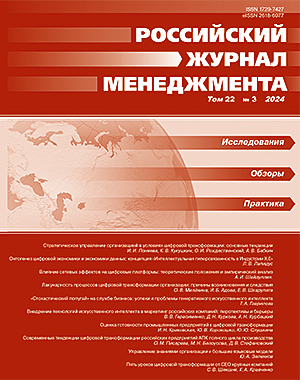Внедрение технологий искусственного интеллекта в маркетинг российских компаний: перспективы и барьеры
DOI:
https://doi.org/10.21638/spbu18.2024.306Аннотация
Цель исследования: выявить современные направления применения технологий искусственного интеллекта в практике маркетингового управления, т. е. в инструментах управления, ориентированного на рынок, а также определить процесс их внедрения в российских компаниях.
Методология исследования: поисковое эмпирическое исследование, направленное на актуализацию выявленных подходов применительно к российскому бизнесу; проведено в форме опроса 235 руководителей и менеджеров российских компаний, представляющих различные сферы бизнеса, в феврале — апреле 2024 г.
Результаты исследования: на основе исследования процесса внедрения технологий искусственного интеллекта в маркетинговое управление различных компаний обоснована система инструментов маркетинга, в которых эти технологии могут быть успешно применены. Систематизированы области их использования в соответствии с логикой маркетинговых задач. Оценены перспективы и существующие барьеры внедрения цифровых технологий в маркетинговую практику отечественных компаний.
Оригинальность и вклад автора: в статье представлено оригинальное исследование, в котором применение технологий искусственного интеллекта проанализировано сквозь призму маркетингового комплекса, что позволило рассмотреть процесс их внедрения комплексно и в аспекте реальных управленческих задач в сфере маркетинга. Впервые предпринята попытка системно оценить реальную практику задействования технологий искусственного интеллекта в управлении маркетингом отечественных компаний, а также обозначены факторы, которые способствуют или препятствуют этому процессу в современных рыночных условиях.
Ключевые слова:
цифровизация управления, технологии маркетинга, искусственный интеллект, маркетинговые инструменты
Скачивания
Библиографические ссылки
References in Latin Alphabet
Translation of references in Russian into English
Загрузки
Опубликован
Как цитировать
Выпуск
Раздел
Лицензия
Статьи журнала «Российский журнал менеджмента» находятся в открытом доступе и распространяются в соответствии с условиями Лицензионного Договора с Санкт-Петербургским государственным университетом, который бесплатно предоставляет авторам неограниченное распространение и самостоятельное архивирование.





